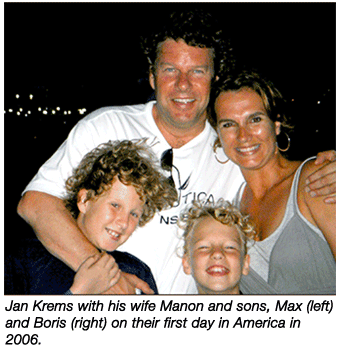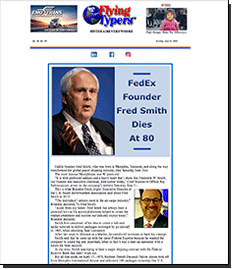

#INTHEAIREVERYWHERE
 |
 #INTHEAIREVERYWHERE |
|
| Vol. 24 No. 31 | Wednesday June 25,
2025 |
|
| |
Jan Krems Time Shift |
Jan (which is the equivalent of John in Dutch) is one of the speakers at TIACA’s Executive Summit in Hong Kong, which opened on St. John’s day, June 24th. This is how TIACA introduces him as a speaker and TIACA Hall Of Fame 2025 award recipient: “Throughout his career, Jan has consistently demonstrated a commitment to innovative thinking, introducing cutting-edge products and quick to market solutions that have reshaped the cargo landscape. United Airlines creative response to COVID-19 coupled with United Cargo’s bold decision to immediately launch cargo-only flights—an industry first—enabled United Airlines to resume international operations faster than any other global carrier. Under his leadership, the team operated more than 17,000 cargo-only flights, helping United navigate one of the most challenging periods in aviation history. Prior to joining United, Jan spent 27 years at KLM Cargo, where he held a range of senior leadership roles including: Vice President Asia; Vice President Europe, Africa, and the Middle East; and Vice President Worldwide Customer Service. In this last role, he played a pivotal part in the global integration of Air France and KLM Cargo, aligning international offices, systems, and teams during and after the merger—an achievement that showcased his exceptional ability to lead through complexity and change.” In October 2014 the legendary Richard Malkin – then 101 y.o. – interviewed Jan Krems for his series “True Confessions”, which was regularly published by Flying Typers in that period. Considering the depth of this interview and its relevance today, we took an interest in reviewing some of those concepts, with Jan Krems witnessing his own change and evolution. 2014 in Las Vegas, in Malkin’s words: “Several years ago, in the barroom of a Las Vegas hotel where an air cargo industry convention was being held, a lusty debate took on the proportions of a high-decibel shouting match. The subject in shrill dispute: has the air cargo industry achieved a solid state of maturity? The question rocked the barroom. The [same] question vaulted back in my mind when I received the news of Jan Krems’ appointment to the presidency of United Airlines Cargo. It struck me at once that Krems’ international crossover from Air France-KLM to the highest rung on the cargo ladder at one of the United States’ great airlines was nothing short of an act of industry maturity—a mirror of events in a globalized marketplace. Air cargo involves the handling and movement of all manner of boxes, bundles, crates, and containers. After nearly 70 years of a postwar air cargo industry, would [Krems] say that the average shipper is fully conversant with the economics of shipping by air? In Krems’ view, the industry “can do a better job of educating the ‘average shipper’ on the benefits of air freight versus other modes.” He called it a “key task” for any service product that’s more expensive than its competing product, to “compensate for the ‘sticker shock’ average shippers might experience when the costs of surface transport are compared against air transport.” The debated continued and it was also noted that “When business turns sluggish, ‘the air cargo industry tends to pull back on process improvement and technological development. During the difficult financial conditions of recent years, other transport modes have upgraded their timeliness and service and are now more formidable competitors.’ Jan Krems maintained that “a coordinated effort to innovate our processes and invest in product and technology improvements” could compensate the almost natural tendency to shift toward cheaper means of transport if they were reliable, rich in data crucial to govern the supply chain. This observation opens a Pandora’s box even today, after a decade or more since Malkin’s October 2014 account. In Hong Kong TIACA is hosting an industry update session, where the question of air cargo maturity will be on the table without any doubt. The landscape in which we discuss business today is certainly not the same as in 2014, as the certainties of globalization have come to a powerful question mark. In 2014 “Krems stated that the carrier, in collaboration with its customers, developed a menu of added-value products, which he described as “key to our business strategy.” There is no better way to boost yields and margins, and concurrently reduce vulnerability to outside factors and softening the impact of negative business and economic cycles that may occur in the future.” In Hong Kong this is the question before the audience of connoisseurs who are regular TIACA’s attendees: “Air cargo and the global economy ended 2024 on a very positive note with the industry growing by over 11% year over year, but 2025 has brought a different complexion, with tariffs, increased regulatory demands, subdued consumer activity, all impacting air cargo demand. What can we expect for the second half of 2025 and beyond?” This debate will inevitably discuss the question of air cargo maturity. Challenges back then in 2014? “Jan Krems responded with the assertion that the “dangers” underlie familiar key issues: cargo security, environmental sustainability, global competition from other transport modes, and less paperwork.” At least three of the four issues are still crucial today and, possibly, still not completely digested in the process. In 2016 we also had had another conversation with Jan Krems and this was the main trait he underlined: “Quality, Quality, Quality. Something I repeat to the team again and again: quality, quality, quality, it’s the only thing that counts. The process of getting this right does not happen overnight, but the direction and goal is set and our performance gets better every day. Getting commercial people, operational folks, customer service, and others together on a bi-weekly basis is key to building a consensus on how to address issues and drive excellence. Also, our leadership team regularly meets with regional leadership and we honestly analyze every aspect of our business. It’s all about transparency and consistent understanding up and down the line. Yesterday I spoke to a half dozen of our biggest customers and my first question was, as it always is: ‘How is our quality doing?’ Basically the response was ‘You are not a top concern for us.’ ‘United Cargo quality is good, it is steadily improving, and we don’t see issues,’ was the reply.” In a way there is a good measure of air cargo maturity that coincides in parts with one of the maxims of logistics: ‘an industry that provides crucial, consistent services of high quality that go mostly unnoticed until they don’t . . .’ At this point we can use another quote from our 2016 article in Krems’s words: “Every time we listen to a customer and meet their needs, every time we deliver a shipment flawlessly as committed, every time we implement a co-worker’s idea for a better process, we move a little closer to our goal.” All things must come in good balance and one aspect of Jan’s personality that strikes us is his ability to keep work and personal life in good balance, as we  noted in another article in 2016. A productive air cargo businessman, Jan is also an admired family person. This is what he told is at that time: “Of course I am very proud of my wife and two sons. One of the things I appreciate most is how they have kept a positive attitude and enthusiasm with every move we’ve made throughout the world. I am grateful beyond words to my wife Manon, who has been with me for more than 27 years and has never complained – despite nine moves to eight different countries following my career. Manon had a career of her own, which she chose to relinquish when we moved and the children arrived. Another sacrifice for the family is the distance from our parents – my sons' grandparents – in Holland. But we make sure we get back there at least once a year and they come to Chicago at least once a year.” noted in another article in 2016. A productive air cargo businessman, Jan is also an admired family person. This is what he told is at that time: “Of course I am very proud of my wife and two sons. One of the things I appreciate most is how they have kept a positive attitude and enthusiasm with every move we’ve made throughout the world. I am grateful beyond words to my wife Manon, who has been with me for more than 27 years and has never complained – despite nine moves to eight different countries following my career. Manon had a career of her own, which she chose to relinquish when we moved and the children arrived. Another sacrifice for the family is the distance from our parents – my sons' grandparents – in Holland. But we make sure we get back there at least once a year and they come to Chicago at least once a year.” Obviously many changes intervened in Jan’s life since then, almost ten years later, but the positive spirit at home and at work remains unchanged and surely this will be signature point in his intervention in Hong Kong, which we shall be privileged to witness. United Cargo will be the medium through which Jan’s personality and ingenuity will be communicated. A more mature Krems will speak, but I am sure his intact resourcefulness will emerge. The question of maturity will be crucial in Hong Kong in my view. For starters we are all getting more “mature” and it is phenomenal that we are still here, by and large all keen to listen and live the experience once again. Whether the world of air cargo is more mature today than it was a decade ago will confidently emerge at TIACA’s: at the Flying Typers we can offer our best wishes, as well as some memories of what has been said, and written, in the last fifty years. This is kind of an achievement on its own if you think about it. On the other hand, one thing is for sure: the world at large is unaffected by the concept of maturity. The world in which we live today is precisely as naïve and inexperienced as it was ten, a hundred, a thousand or more years ago. It never learns from its lessons and it is never scared of new experiments that may in fact destroy us all. In a way humanity is in balance between an enormous warehouse of concepts accumulated through knowledge and experience and the thrill of throwing itself into the brisk air of paragliding for the first time. I am curious to hear what Jan Krems will tell us in June 2025 and I am sure it will be memorable, as it ever was. Marco Sorgetti |
If
You Missed Any Of The Previous 3 Issues Of FlyingTypers Access complete issue by clicking on issue icon or Access specific articles by clicking on article title |
||
 Vol. 24 No. 28 Vol. 24 No. 28Between Infrastructure & Tariff Where Is Trade? Action/Reaction Transport Logistic Delta Cargo Expands B767-400 On Ice Brian Wilson Thanks For The Music |
 Vol. 24 No. 29 FedEx Founder Fred Smith Dies At 80 |
|
Publisher-Geoffrey Arend • Managing
Editor-Flossie Arend • Editor Emeritus-Richard Malkin |
Send comments and news to geoffrey@aircargonews.com
|